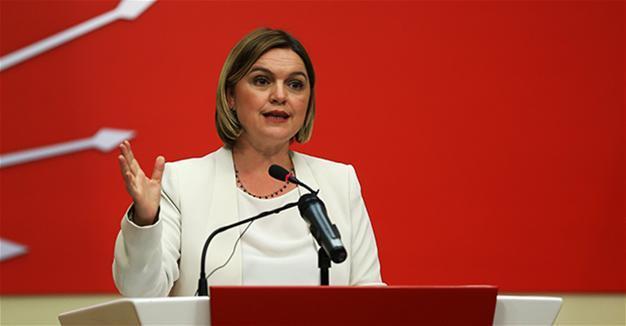Main opposition CHP deputy head, spokesperson Böke resigns
ANKARA
 Selin Sayek Böke, the main opposition Republican People’s Party (CHP) spokesperson and deputy head responsible for the economy, announced her resignation from her duties on May 6, citing the lack of a political fight within the party against the April 16 referendum results.
Selin Sayek Böke, the main opposition Republican People’s Party (CHP) spokesperson and deputy head responsible for the economy, announced her resignation from her duties on May 6, citing the lack of a political fight within the party against the April 16 referendum results.In her resignation statement, Böke said conceding the April 16 referendum results, which she described as having been “usurped through illegal means,” was an injustice to millions of people who voted against the amendments to shift the country’s governance system to an executive presidency with greatly enhanced powers for President Recep Tayyip Erdoğan.
“As a politician who believes in participatory democracy and the universal principles of social democracy, I do not find the mentality of the current administration acceptable at this point. For that reason, I am resigning from my posts of deputy chair and party spokesperson,” Böke said while noting that she would continue to fulfill her functions as a party assembly member and deputy.
She also said the party had failed to take necessary steps in a determined and clear way in the aftermath of the referendum.
According to Böke, the party adopted a manner that led to criticisms over its intra-party democracy and organizational structure instead of “strengthening the voice of millions of people” who disapproved of the changes.
Voters went to the polls on April 16 to decide whether to approve changes to the country’s constitution, including a shift from the parliamentary system to an executive presidency.
According to official results by the Supreme Election Board (YSK), the “yes” campaign won with 51.41 percent, while the “no” vote stood at 48.59 percent.
The party immediately appealed the board’s decision to abruptly accept ballots lacking an official seal as valid, but the YSK rejected the objection three days after the referendum.
Immediately following the results, Böke stated that the CHP would use all its democratic rights to ensure the referendum is rerun.
Her comments were interpreted as a sign that the party could boycott parliamentary work.
“By [all democratic rights], I include the possibility of either seceding from parliament or continuing to work in parliament,” Böke said.
However, after the board meeting, CHP Deputy Group Chairperson Levent Gök said it “had not adopted an approach in line with seceding from parliament.” Böke’s suggestion was also dismissed by party leader Kemal Kılıçdaroğlu.
On April 25, the Council of State also rejected the party’s appeal to repeal the YSK’s decision.
Recently, the party filed complaints against Council of State members within the YSK with the Council of State, and Supreme Court members with the Supreme Court, demanding an investigation to be launched into them for the decision to accept the unsealed ballots “unless it can be proved that they were brought from outside the voting room.”
Separately, CHP deputy Muharrem İnce on May 5 called for an extraordinary general assembly to hold a leadership election.
In addition, the CHP leader slammed dissident voices among the party’s cadres after former party leader Deniz Baykal urged him to commence a process to determine the presidential candidate of the party and said “either be the candidate or step out.”
“Nobody should exceed the level of criticism and say ‘I can say whatever I want publicly.’ I will show the door to whoever harms the party. It is that simple,” Kılıçdaroğlu said.
“I will eliminate them from the party. They can form their own parties. For example, they can form a gossip party where they can gossip all day long,” he added.
The party assembly meanwhile convened on May 7 to discuss referring a deputy to the high disciplinary board after his remarks on Kılıçdaroğlu.
CHP Mersin deputy Fikri Sağlar said on May 2 that “Kılıçdaroğlu has fought against a one-man regime but he became a ‘one man’ in his party.”
Meanwhile, commenting on recent claims on the possible formation of a party by the “no” block, Deputy Prime Minister Numan Kurtulmuş on May 7 called such an initiative “impossible,” stating that political parties with different opinions could not come together just because they voted against the changes.
“Such fluctuations in politics happen after every election. It is obvious that it is impossible that political parties, whose worldviews, perception of politics and readings of Turkey are diametrically opposite, would come together and form a common roof just because they said ‘no.’ That amounts to making water flow up the hill,” Kurtulmuş said.
















